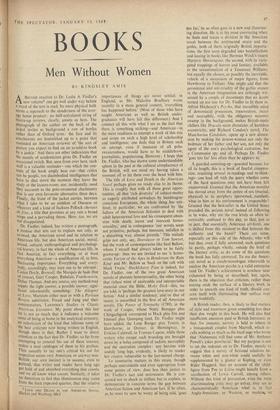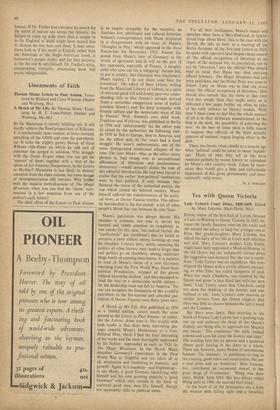BOOKS
Men Without Women
By KINGSLEY AMIS
ABRITISH reaction to Dr. Leslie A. Fiedler's new volume* can get well under way before a Word of the text is read. Its mere physical bulk seems a reproach to the slenderness of the aver- age home product: no half-articulated string of
blown-up reviews, clearly, awaits us here. The Photograph of the author on the back of the Jacket invites as background a row of bottles
rather than of Oxford texts: the face and its
attachments are beatnikked up to a point that reminded an American reviewer of 'the sort of Picture you expect to find on an as-told-to book by a junkie.' And there are other indications that the mantle of academicism gives Dr. Fiedler an occasional twitch. But, seen from over here, such stuff is a valuable reminder—one which the con- tents of the book amply bear out—that critics can be people, not disembodied intelligences that
have to shut down the moment they leave the
study or the lecture-room; nor, incidentally, need they succumb to the polo-sweatered charlatanry
that is our own favourite alternative these days.
Finally, the front of the jacket carries, between What I take to be an emblem of Oneness or
Whatever and a kind of Jackson Pollock chevaux de frise, a title that promises at any rate a broad scope and a pervading theme. Here, too, we are not disappointed.
Dr. Fiedler, indeed, has written a pantograph, a treatise that sets out to explain not only, as avowed, the American novel and its relation to American life, but also American social, moral, sexual, cultural, anthropological and psychologi- cal history, in fact the whole of American life, in fact America, in fact everything, or at least everything American—a qualification of, to him, fluctuating importance. Everything and every- body, accordingly, may turn out to be relevant: Conan Doyle, Beowulf, the Marquis de Sade (but of course), Gary Cooper, Rabelais, Frankenstein, Dylan Thomas. And any source, any method-may Supply the right answer, a possible answer, signi- ficant informatiOn, something: The Allegory
01 Love, Marxism either neat or with a Partisan Review admixture, Freud and Jung and their
Commentators, Lawrence's Studies in Classic American Literature. My point about this last lot is not so much that it indicates a welcome sense of being at home in the analytical armoury, an eclecticism of the kind that informs some of the best criticism now being written in English. though there is that. Rather I want to direct attention to the fact that Dr. Fiedler, so far from attempting to conceal his use of these sources, makes a neat catalogue of them in his preface. Thus casually to lay one's critical kit out for inspection seems very American, or anyway non-
British; our on instinct is to assume, even to pretend, that writer and reader have long ago got hold of and absorbed everything that counts, and we all know what counts. Similarly, it takes an American to feel that illumination may come from the least expected quarter, that the relative s LOVE AND DEA1II IN 111E AMERICAN NOVEL.
(Seeker and Warburg, 600
importances of things are never settled; in England, as Mr. Malcolm Bradbury wrote recently in a more general context, 'everything has happened before.' (Most of those who have taught American as well as British , under- graduates will have felt this difference.) And I connect all this with what I see as the fact that there is something striking—and American—in the mere readiness to attempt a work of this size and scope on such a high level of scholarship and intelligence; one feels that in Britain such an attempt, even if innocent of all polo- swcatcrcdness, would have to be middlebrow, journalistic, popularising. However : I hope that Dr. Fiedler, who has shown some understandable spleen in the past at the cultural complacency of the British, will not mind my having taken a moment off to hit them over the head with him.
The title of Love and Death in the American Novel perhaps gives no ready clue to its theme. This is roughly that with all those great oppor- tunities, all that 'rich diversity' of subject-matter so eagerly attributed nowadays by bandwagon- conscious Europeans, the whole thing has mis- fired; in particular, we are confronted by 'the failure, of the American fictionist to deal with adult heterosexual love and his consequent obses- sion with death; incest and innocent homo- sexuality.' and in consequence 'our novels seem not primitive, perhaps, but innocent, unfallen in a disturbing way, almost juvenile.' This malady grips not only, say, Deerslayer or Tom Sawyer, but the work of contemporaries like Saul Bellow, whom I myself had always taken to be fairly grown-up: thus we are invited to see 'a homo- erotic Tarcan of the Apes in Henderson the Rain King' and Mr. Bellow as 'back on the raft with Mark Twain.' Huckleberry Finn is indeed, for Dr. Fiedler, one of the two great American novels of platonic homosexuality, the other being that richest mine of analysable and interpretable material since the Bible, Moby Dick—this, we are told, is 'perhaps the greatest love-story in our fiction.' And a similar tendency, and/or that of incest, is unearthed in the first of all American novels, The Power of Sympathy (1789), in the work of Cooper, whose Natty Bumppo plus Chingachgook correspond to Huck plus Jim and Ishmael plus Queequeg (and, Dr. Fiedler might have added, the Lone Ranger plus Tonto), in Hawthorne, in Dreiser, in Hemingway, in Erskine Caldwell, in Truman Capotc, while those writers who escape such branding arc brought down by a bolas composed of sadism, necrophily and the castration complex: any heroine with unduly long legs, evidently, is likely to render her creator vulnerable to the last-named charge.
To summarise matters in this strain, though perhaps unavoidable and even appropriate from some points of view, does less than justice to Dr. Fiedler's tact and seriousness. He is con- cerned not to shock or titillate but to explain, to demonstrate in concrete terms the gap between American fiction and American fact. If he often, as he must by now be weary of being told, 'goes
too far,' he as often goes in a new and illuminat- ing direction. He is at his most convincing when he finds and traces a division in the American novel between the sentimental strain and the gothic, both of them originally British importa- ticms, the first soon degraded into bestsellerdom and issuing in books like Herman Wouk's recent Marjorie Morningstar, the second, with its varie- gated trappings of horror and fantasy, available to the sensationalism of a Tennessee Williams, but equally the chosen, or possibly the inevitable, vehicle of a succession of major figures, from Hawthorne to Falkner. One might add that the persistence and universality of the gothic stream in the American imagination are strikingly wit- nessed by a couple of documents that no doubt turned up too late for Dr. Fiedler to fit them in. Alfred Hitchcock's Psycho, that incredible salad of demoniacal possession, transvestism, incest and necrophily, with the obligatory miasmic swamp in the background, makes British-made chillers like Dracula seem chronicles of harmless eccentricity, and Richard Condon's novel, The Manchurian Candidate, opens up a new dimen- sion by making the demon-woman not only the bedmate of her father and her son, not only the agent of the son's psychological castration, but a Communist spy and all. Perhaps Dr. Fiedler `goes too far' less often than he appears to.
A guarded summing-up—guarded because, for all its length, this is a book of fearful compres- sion, requiring several re-readings and re-think- inks—can lead off with the query whether some of the hard questions may not have been left unanswered. Granted that the American novelist has moved away from the centre of sex (marital, physical) to its periphery (perverted, rarefied), what in him or his environment is responsible? Granted that the best-seller in the United States preceded the serious novel instead of following in its wake, why are the two levels so often in- extricably confused to this day, so that, just as in jazz, that essentially American art-form, one is shifted from this moment to that between the authentic and the banal? There are some, especially on this side of the Atlantic, who will feel that, even if fully answered, such questions lie partly, perhaps wholly, outside the brief of the literary critic, as do some of the questions the book has fully answered. To use the Ameri- can novel as a couch-monologue wherewith to analyse the American psyche is a valid enterprise (and Dr. Fiedler's achievement is nowhere near exhausted by being so described), but, again, there is the objection that criticism, rather than tearing aside the surface of a literary work in order to unearth one kind of truth, should con- cern itself with illuminating that surface ever more truthfully.
A British reader, then, is likely to find matters of style and treatment given something less than their due weight in this book. He will also find insufficient attention paid to British literature, so that, for instance, nevety is held to inhere in a (misquoted) couplet from Marvell, which re- calls nothing so much as the local sage who wrote that 'Alabamans will find some of Mr. Anthony Powell's jokes provincial.' But my purpose is not to set .the redcoats on to Dr. Fiedler, merely to suggest that a survey of fictional relations be- tween white and non-w hite could usefully be -supplemented by a glance at Kipling, or even Rider Haggard, that an account of the child- figure from Poe to Lolita might benefit from a recollection of Lewis Carroll, among others. Without this kind of precaution, even the most discriminating critic may go astray, may sec as characteristically American what is in fact Anglo-American, or Western, or modera. or human. If Dr. Fiedler had extended his search for the novel of mature sex across the Atlantic, his failure to Conic up with more than a couple or so (in England at least) might have caused him to shorten his line here and there. It does some- times look as if the novel in English, rather than the American or the Anglo-American novel, is tomorrow's proper study; and for that purpose, as for the one he sets himself, Dr. Fiedler's witty, exasperating, energetic, penetrating book will prove indispensable.



































 Previous page
Previous page